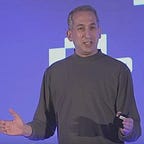Meta CTO Andrew Bosworth told us recently that using AI for advertising, generative AI that is, will be a top priority for this year. What’s the concern?
It’ll start with simple product placements. That can of Coke in your instagram photo will somehow become a Pepsi. A car you like may be inserted onto an empty spot on the street. It’s harmless, right?
We know that using actors or models that resemble you increases the effectiveness of ads. Next, we’ll see the people in the ads look as much like you as the advertisers want, using deepfake generative AI.
Then there’s a question of using your friends or perhaps some people you’re known to be attracted to (or both) in hyper personalized ads that try to push your emotional buttons: envy, attraction, fear of loss or missing out, false promises of happiness that most products can’t deliver.
Adding smart glasses with eye tracking and world-facing cameras can give such companies even more information about what you like and feel about whatever you see in the world. If you liked a handbag someone was carrying, you’ll get an automatic reminder to buy. Are you still good with it?
Next, consider if you were ever moved by “signs from the universe” at the right time and place to make a hard decision one way or the other. If the system thinks you’re…
